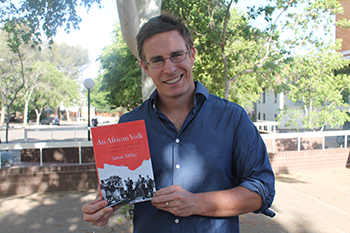Latest News Archive
Please select Category, Year, and then Month to display items
20 December 2019
|
Story Thabo Kessah
|
Photo Thabo Kessah
 Dr Deidré van Rooyen from the Centre for Development Support, Dr Jared McDonald (Department of History), Moodi Matsoso, and Bishop Billyboy Ramahlele with the mobile device.
Dr Deidré van Rooyen from the Centre for Development Support, Dr Jared McDonald (Department of History), Moodi Matsoso, and Bishop Billyboy Ramahlele with the mobile device.
In an effort to broaden the storytelling horizons and to answer to the demands of the Fourth Industrial Revolution, Community Engagement on the UFS Qwaqwa Campus recently launched the Digital Storytelling project, aimed at broadening access to good community stories.
“We have partnered with the Common Good First initiative to enhance the service that we provide as a department,” said Bishop Billyboy Ramahlele, Director: Community Engagement.
“We challenge all academics, support staff, the SRC and students in general, to take advantage of this channel to communicate their stories to the world,” he said.
Histories of royal families
“The digital documentation of the histories of the royal families in the Qwaqwa area is in the pipeline and will be conducted in partnership with the Department of History. We have come to realise that with times changing, the younger generation loses track of the precious histories, and this platform will help in preserving that,” he added.
Community Engagement coordinator, Moodi Matsoso, also revealed that space has been identified for the lab. “At the moment, we are operating on mobile digital storytelling devices, with all the necessary equipment such as tablets and cameras. However, we will soon have a fully-fledged lab on campus,” she said.
This project is co-funded by the Erasmus+ Programme of the European Union.
US author launches book at UFS on African volk
2016-10-17

Dr Jamie Miller, Postdoctoral Fellow at the
University of Pittsburgh and author of
An African Volk: The Apartheid Regime
and Its Search for Survival.
Photo: Rulanzen Martin
“I realised the importance of not just accessing the policies and political approaches of the leaders of the apartheid regime, but understanding the ideas and world views that informed them. Part of the solution to this was to learn Afrikaans.”
This is according to Dr Jamie Miller, a Postdoctoral Fellow at the University of Pittsburgh, on how he went about getting inside the mind of South Africa’s apartheid regime in order to complete his book, An African Volk: The Apartheid Regime and Its Search for Survival.
The book was launched on 11 October 2016 by the Archive for Contemporary Affairs at the University of the Free State on the Bloemfontein Campus.
Volk refers to the Afrikaner nationalist movement
The book is an ambitious new international history of 1970s apartheid South Africa. It is based on newly declassified documents and oral histories, the majority in Afrikaans, which focus on the regime’s attempts to turn the new political climate to its advantage.
The term volk refers to the Afrikaner nationalist movement, also known as Afrikanerdom. The story of Afrikaner nationalism was the medium through which the regime gained power.
Four main messages from the book
Dr Miller says there are four main messages for his readers. Firstly, the apartheid regime looked to contest and hijack new ideas and norms that formed the postcolonial world, and secondly, that we need to start thinking more seriously about the Cold War in terms of domestic politics, not just geopolitics.
Thirdly, South Africa should be integrated into histories of the global South, and lastly, we should conceptualise the apartheid regime by looking at it not just as an imperial holdover, but also by looking at what was happening in the world in the time period in question.